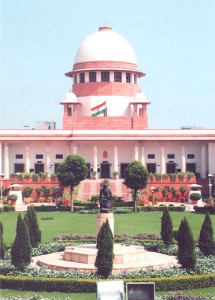Supreme Court Strikes Down Government Role in Selecting Judges
NEW DELHI: The Supreme Court today struck down a new law that gives the government more say in appointing judges, setting up a potential confrontation between the judiciary and the executive.
A five-judge Constitutional bench has declared as “unconstitutional” a new law enacted in April, which set up a National Judicial Appointments Commission comprising three non-judicial members.
The court said the two decades-old system of judges being appointed or transferred by a collegium – a group of five senior judges – would continue.
The Supreme Court will consider suggestions to improve the collegium system on November 3.
Petitions filed by a Supreme Court advocates’ group among others argued that the new system demolished the independence of the judiciary by giving the government a big role in the selection of judges.
“The judges ruled that the independence of the judiciary is a basic structure of the Constitution and cannot be tampered with,” said advocate Suraj Singh, one of the petitioners.
During arguments before the Constitution bench, the government’s top lawyer, Attorney General Mukul Rohatgi had said it is a myth that judges alone can decide on who is the best person to be a judge.
The National Judicial Appointments Commission was passed in Parliament and notified by the government even as the Constitution bench was hearing petitions challenging it.
According to the new law notified in April, the National Judicial Appointments Commission would have six members – the Chief Justice of India, the two most senior judges of the Supreme Court, two eminent persons, and the Law Minister.
The two eminent Indians would be chosen by the Chief Justice, the PM and the leader of the largest opposition party in the Lok Sabha.
Days after the appointments panel was put in place, the Chief Justice of India, HL Dattu, wrote to Prime Minister Narendra Modi that he would not be a part of it until the Supreme Court decides on its validity.
Kindly send reply or comments on this topic to [email protected]
Source:Ndtv




